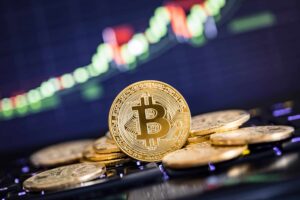Olaf Carlson-Wee said the VC firm’s tight risk controls proved invaluable.

Polychain Capital founder and CIO Olaf Carlson-Wee said he was pitched by Sam Bankman-Fried many times but never said yes.
(Unchained archives)
Posted January 23, 2024 at 7:00 am EST.
Unlike many other big crypto investors, Olaf Carlson-Wee says his venture capital firm Polychain Capital managed to emerge relatively unscathed from all the big blow-ups of 2022, including those of Sam Bankman-Fried’s FTX and Alameda, and Terra Luna/UST.
That’s because Carlson-Wee, who’s been investing in crypto since 2011 and was the first employee at Coinbase, adheres to strict risk controls given that crypto is inherently a “risky and speculative asset class.”
“Because of that, I actually like to have extremely tight risk controls around the things we can control,” Carlson-Wee told the Unchained podcast. “And I don’t want to ever get overconfident or add on risk that’s like this unnecessary risk. We already have enough market consumer adoption, hardcore technology risk, [and] security risks with these protocols.”
Chief among those potential added risks is having counterparty risk.
Read more: What Is Counterparty Risk in Crypto? A Beginner’s Guide
“I’ve always been extremely paranoid from the beginning of Polychain about counterparty risk,” Wee noted. “And what I mean by that is where are the coins? Are they sitting on exchanges? Let’s say we do lending agreements. Who is that person we’re lending to? If it’s through one of these lending desks, who are they lending the coins to and where are those coins ultimately living?”
No Lending at Scale, Nor Leverage
Carlson-Wee explained that Polychain has had a lot of investors encourage the company to lend out its crypto holdings for extra yield over the years, but he almost always says no, saying the risk-reward ratio is not worth it.
“We don’t really engage in lending at scale at all,” Carlson-Wee said. “We just have never done it. And it’s because it just takes on this extra counterparty risk to get a little bit of return, but you’re sort of missing the big picture, which is that if we play our cards right, the return we’re going to get is very, very good and let’s not take on this additional risk.”
Carlson-Wee also said he also typically doesn’t use leverage on his investments.
“I don’t try to time the market and move up and down my exposure and lever up,” Carlson-Wee said. “You know, 50% drops in crypto are not black swan events. It happens every two years. So if you’re on 2x leverage, you’re just going to get blown out every other year in crypto. It’s not a reasonable way to trade in this market and survive for the long term and make returns sustainably.”
FTX and Terra Luna/UST
Carlson-Wee said that his aversion to added risk is what allowed Polychain to avoid getting sunk by the big crypto blow-ups of 2022.
With respect to FTX and Alameda, Carlson-Wee noted that he “got pitched by Sam many, many times and passed every time because there was such an obvious and irreconcilable conflict of interest between FTX and Alameda. And that turned out to be the thing that destroyed the whole thing.”
Carlson-Wee further explained that all the coins FTX and Alameda launched had a very low float in which there was a mismatch between price and liquidity. “So it looks like it’s worth a hundred billion dollars, but you really try to sell and get out and you get nothing,” Carlson-Wee said.
Read more: FTX Estate Responsible for $1B of GBTC Outflows: Report
As for Terra Luna and UST, Carlson-Wee said he recognized early on a system that in some sense collateralized itself was not sustainable. “We had had this experiment play out for years,” he said, noting that Polychain had invested in Luna early in its existence when it was a smart contract play, but then exited once it pivoted to becoming an algorithmic stablecoin system.
Read more: Terraform Labs, Do Kwon Sold Unregistered Securities, U.S. Judge Rules
In the end, Carlson-Wee said Polychain was able to avoid the worst of 2022’s blow-ups “80% because of real risk management philosophy that I had in place for years and years, and 20% luck. There’s always luck in these things.”
And overall, Carlson-Wee feels very positive about how his company managed all the turmoil.
“I feel actually very, very good about the way that Polychain navigated 2022,” Carlson-Wee said. “Obviously we got taken down with the macro draw down, but all the specific landmines, we avoided stepping on.”
- SEO Powered Content & PR Distribution. Get Amplified Today.
- PlatoData.Network Vertical Generative Ai. Empower Yourself. Access Here.
- PlatoAiStream. Web3 Intelligence. Knowledge Amplified. Access Here.
- PlatoESG. Carbon, CleanTech, Energy, Environment, Solar, Waste Management. Access Here.
- PlatoHealth. Biotech and Clinical Trials Intelligence. Access Here.
- Source: https://unchainedcrypto.com/how-polychain-capital-avoided-the-crypto-blow-ups-of-2022/
- :has
- :is
- :not
- :where
- $UP
- 2011
- 2022
- 2024
- 23
- 31
- 32
- 33
- 7
- a
- Able
- About
- actually
- add
- added
- Additional
- Adoption
- agreements
- Alameda
- algorithmic
- algorithmic stablecoin
- All
- allowed
- almost
- already
- also
- always
- am
- among
- an
- and
- archives
- ARE
- around
- asset
- asset class
- At
- aversion
- avoid
- avoided
- Bankman-Fried
- BE
- because
- becoming
- been
- Beginning
- between
- Big
- Big Picture
- Billion
- Bit
- Black
- Black Swan Events
- but
- by
- CAN
- capital
- capital firm
- Cards
- ceo
- CIO
- class
- coinbase
- Coins
- collateralized
- company
- conflict
- consumer
- consumer adoption
- contract
- control
- controls
- Counterparty
- crypto
- Crypto investors
- Desks
- destroyed
- do
- Do Kwon
- Doesn’t
- dollars
- done
- Dont
- down
- draw
- Drops
- Early
- emerge
- Employee
- encourage
- end
- engage
- enough
- estate
- events
- EVER
- Every
- Exchanges
- existence
- experiment
- explained
- Exposure
- extra
- extremely
- feel
- feels
- Firm
- First
- Float
- For
- founder
- Founder and CEO
- from
- FTX
- further
- GBTC
- get
- getting
- given
- going
- good
- got
- had
- happens
- hardcore
- Have
- having
- he
- High
- his
- Holdings
- How
- HTTPS
- hundred
- i
- if
- in
- Including
- inherently
- interest
- invaluable
- invested
- investing
- Investments
- Investors
- IT
- ITS
- itself
- January
- jpg
- judge
- just
- Know
- Kwon
- Labs
- launched
- lend
- lending
- lever
- Leverage
- like
- Liquidity
- little
- living
- Long
- LOOKS
- Lot
- Low
- luck
- Luna
- Macro
- make
- managed
- management
- many
- Market
- max-width
- mean
- missing
- more
- move
- my
- never
- no
- noted
- nothing
- noting
- obvious
- of
- Olaf Carlson-Wee
- on
- once
- ONE
- or
- Other
- our
- out
- outflows
- over
- overall
- passed
- person
- philosophy
- picture
- pitched
- Place
- plato
- Plato Data Intelligence
- PlatoData
- Play
- POLYCHAIN
- PolyChain Capital
- Polychain Capital founder
- positive
- posted
- potential
- price
- protocols
- proved
- ratio
- real
- really
- reasonable
- recognized
- relatively
- respect
- responsible
- return
- returns
- right
- Risk
- risk management
- risks
- s
- Said
- Sam
- Sam Bankman-Fried
- say
- saying
- says
- Scale
- Securities
- security
- security risks
- sell
- sense
- since
- Sitting
- smart
- smart contract
- So
- sold
- some
- specific
- speculative
- Speculative Asset
- stablecoin
- stepping
- Strict
- such
- survive
- sustainable
- sustainably
- swan
- system
- Take
- taken
- takes
- Technology
- term
- Terra
- Terra LUNA and UST
- that
- The
- The Coins
- then
- There.
- These
- they
- thing
- things
- this
- those
- Through
- time
- times
- to
- trade
- try
- Turned
- two
- typically
- u.s.
- Ultimately
- Unchained
- unnecessary
- unregistered
- unregistered securities
- use
- UST
- VC
- venture
- venture capital
- venture capital firm
- very
- want
- was
- Way..
- we
- What
- when
- which
- WHO
- whole
- with
- Worst
- worth
- year
- years
- yes
- Yield
- You
- zephyrnet













